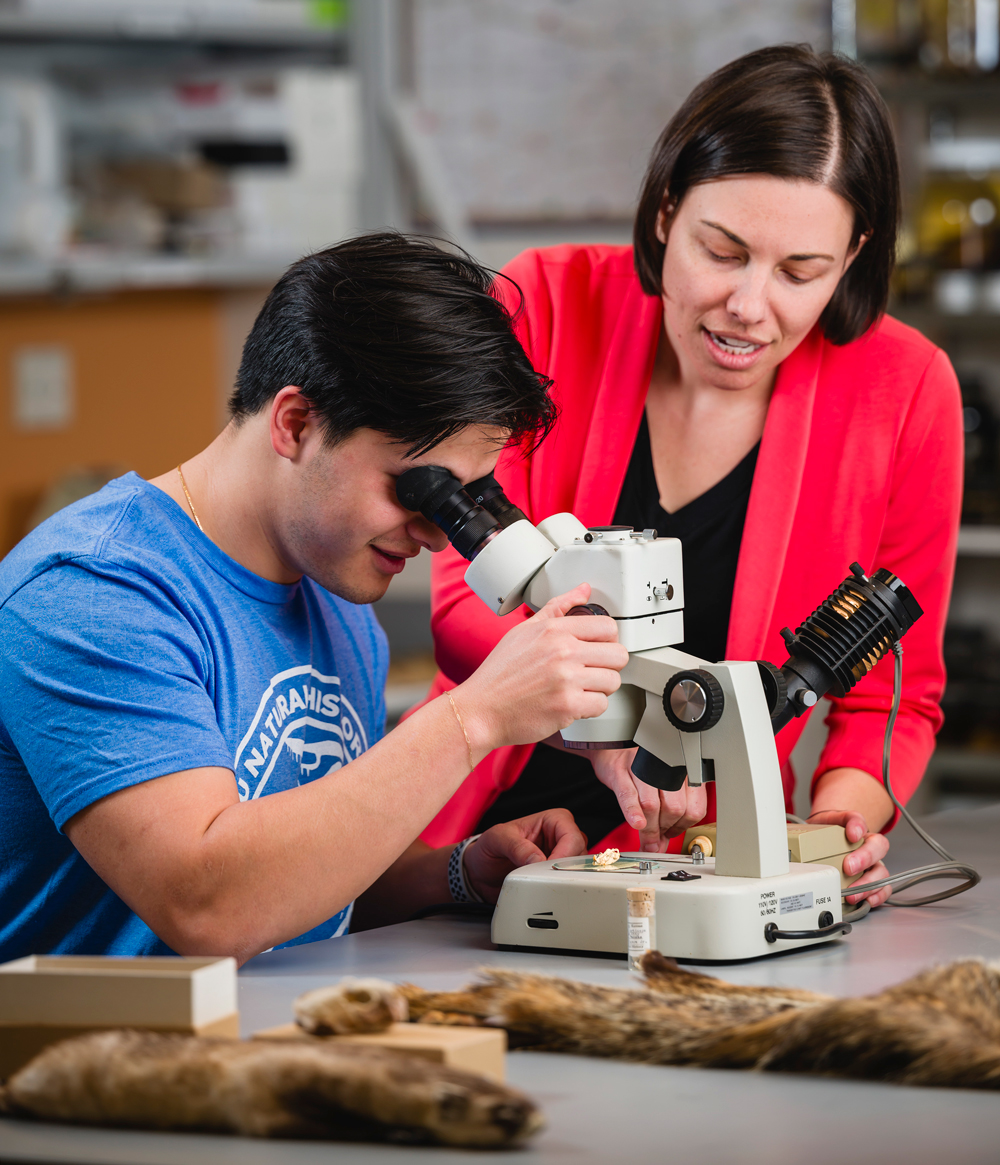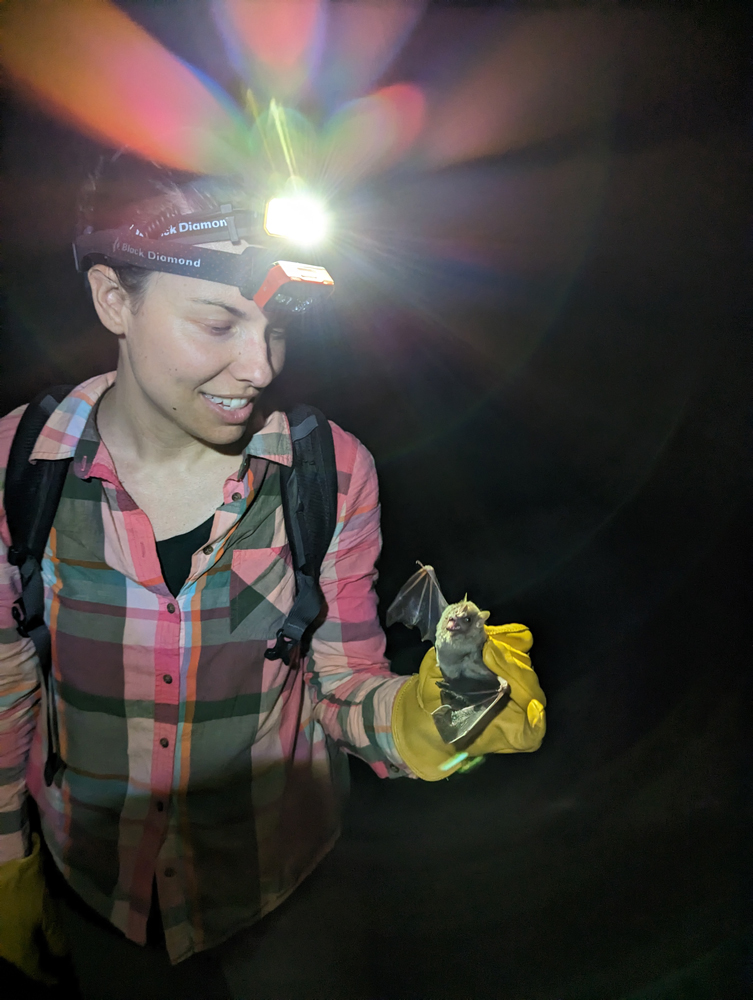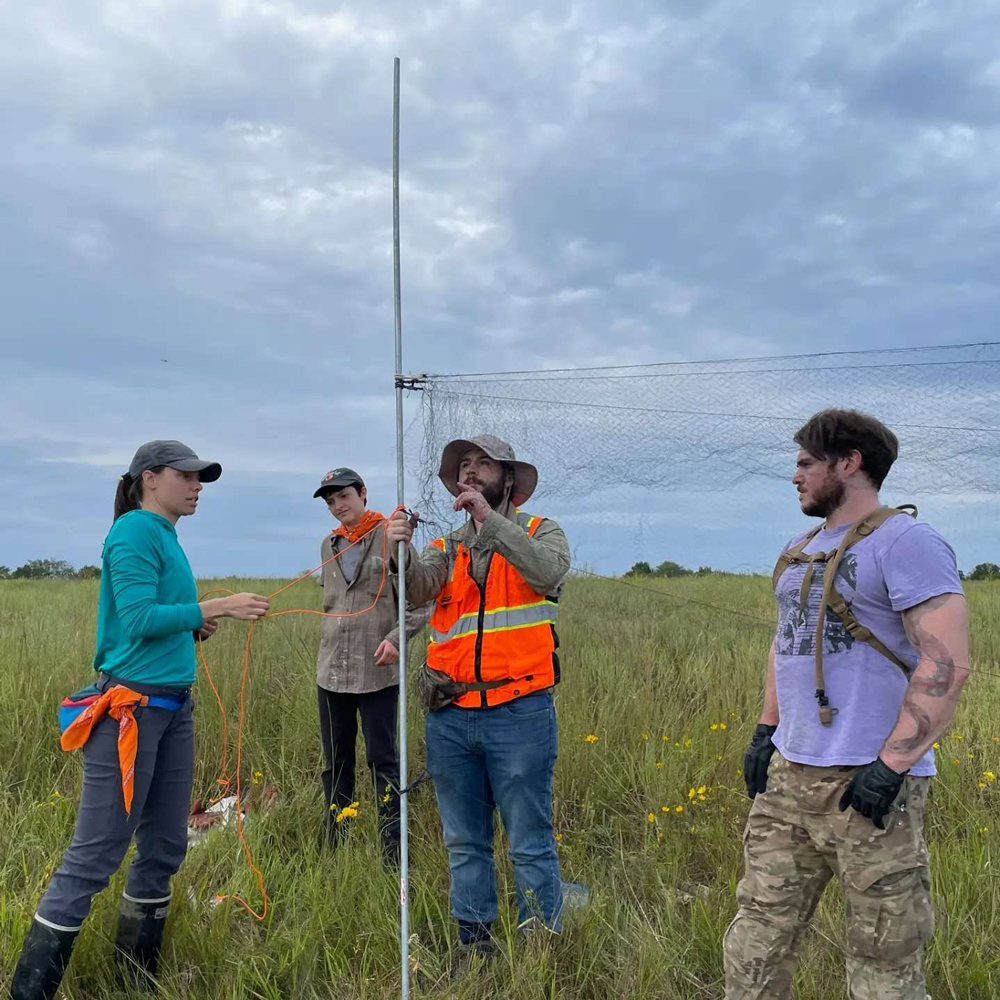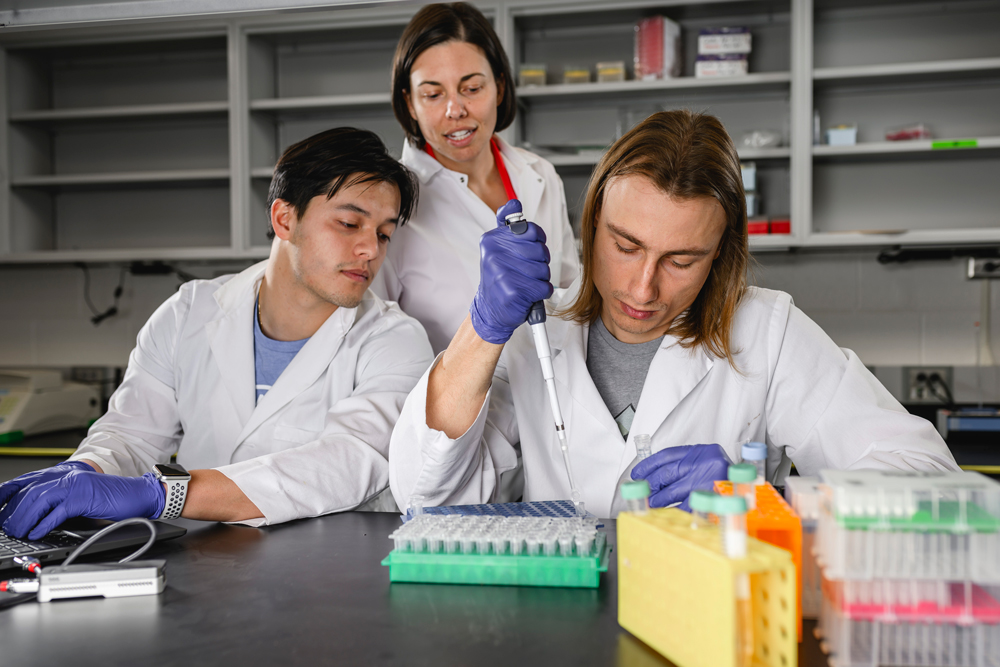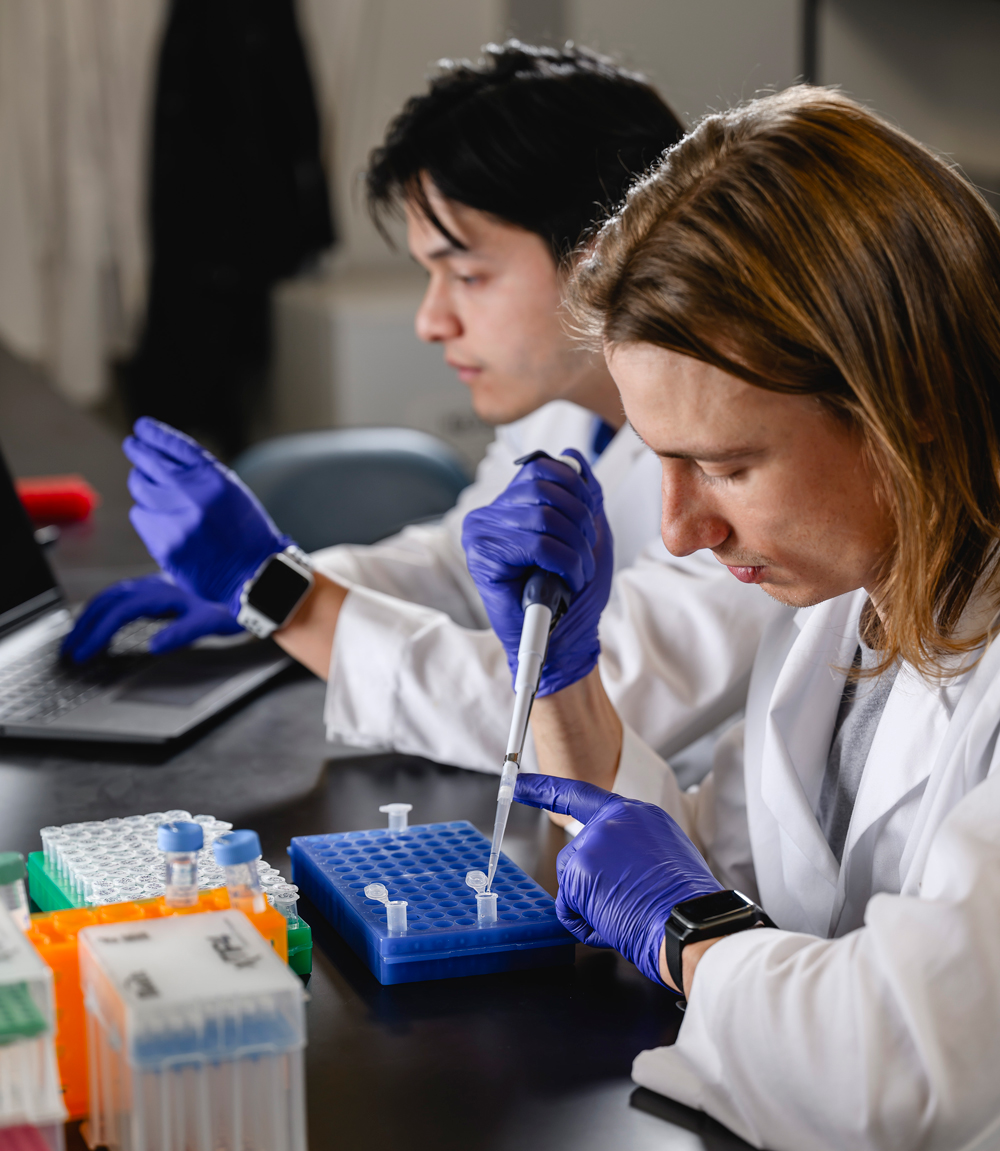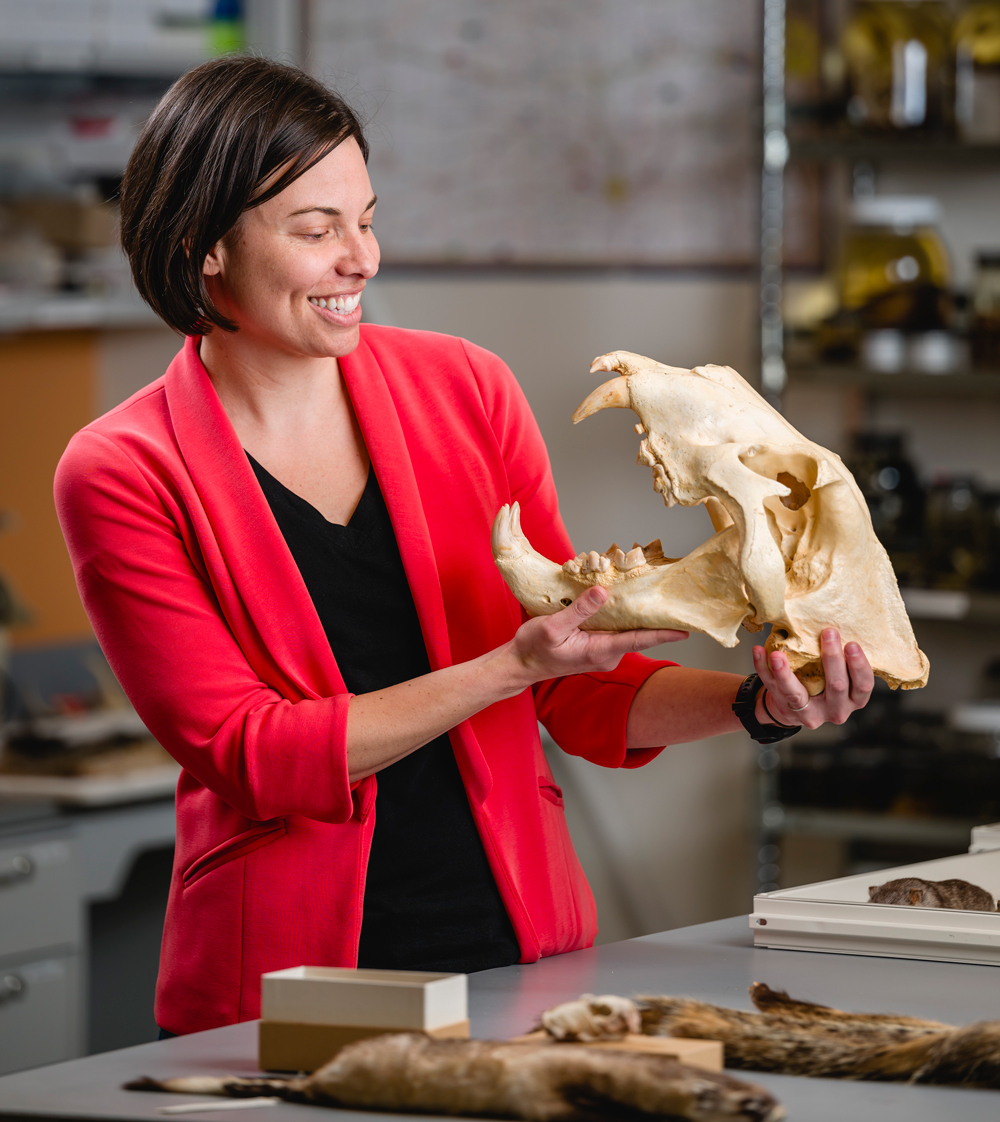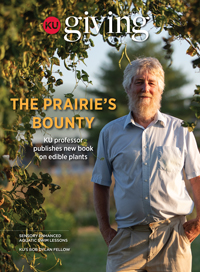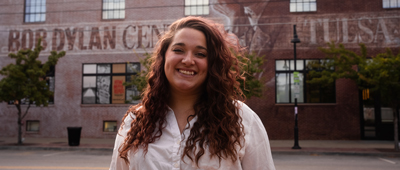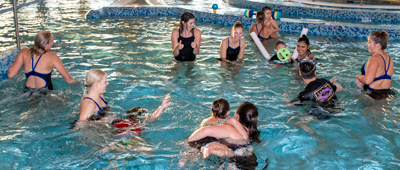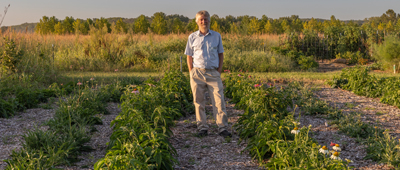KU Giving Magazine
A Hub of Discovery
Valerie Gieler, with contributions by Anne Tangeman
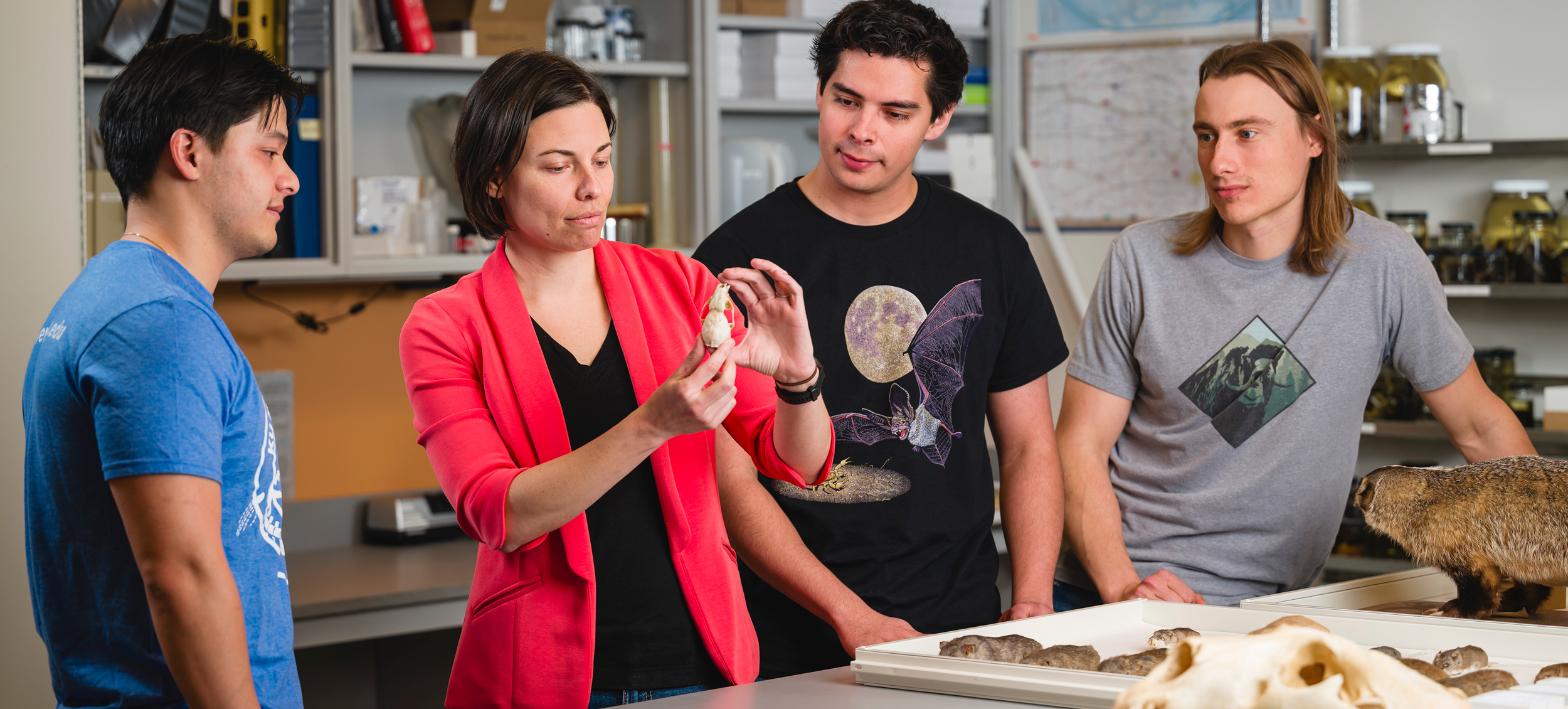
SPECIMEN DISCUSSION: Robert W. and Geraldine Wilson Assistant Professor Jocelyn Colella shows student researchers (from left) Alex Hey, Daniel Ibañez IV and Ben Wiens what types of information the skull of a small mammal can reveal.
KU faculty researchers inspire the next generation of innovative thinkers
There are no typical days in University of Kansas Professor Jocelyn Colella’s Lab at the KU Biodiversity Institute.
“We’re able to give students multiple types of experiences,” said Colella, the Robert W. and Geraldine Wilson Assistant Professor of Ecology and Evolutionary Biology. “They can work in the museum collections, get molecular lab and computer experience, and then go outside and see the organism they’re working with in real life. We call it ‘full stack biology,’ a term we’ve borrowed from software development. You get to do the stuff in the field, the stuff in the lab and then learn how to write and publish, which I think is a valuable set of skills for all students.”
As a conservationist at heart, Colella is a collections-based evolutionary biologist who uses mammals as models to understand how organisms change through time. Discovery of pathogens is an aspect of her research program that connects wild animals to human health. Nearly 80% of emerging diseases are zoonotic in origin, which means they begin in animals. While this can initially lead to fear, Colella sees it as an opportunity to be strategic and identify potential threats so they can be managed.
“Through museums, we can take a proactive response to figuring out what’s out there before we have an issue with it,” she said. “I do a lot of biodiversity discovery, including viral discovery, that allows scientists, communities and policymakers to be proactive in understanding, studying and identifying potential emerging threats. This is also positive for conservation, the other main thrust of my research program. Genetics can tell us a lot about the health of a population and how populations change through time.”
The opportunity to do research at the Biodiversity Institute and work in the Colella Lab was a primary factor for Alex Hey, of Chicago, to select KU for his ecology and evolutionary biology graduate studies. “With my work in particular, the primary applications and value come from viral monitoring. Obviously, with the pandemic a few years ago, it really put on our minds how much we need to emphasize global viral surveillance in mammals. This information isn’t just used by one researcher for one project right now, especially with bioinformatics and the way digital information is shared. All the specimens collected for my research, for example, are going to be open and publicly available to researchers at other institutions to use and reuse through the KU Biodiversity Institute’s Division of Mammals.”
Life in the lab
Researchers of all levels — from undergraduates to emeritus faculty members — contribute to the Colella Lab. This creates a dynamic and energetic atmosphere where everyone has the opportunity to learn from each other and look at a question or problem from a different point of view.
Museum Studies graduate student Catherine Dhority enjoys the interactions in the lab and the ability to personally investigate how collections are used in research, the questions that can be answered with them, and the process and issues concerning their preservation and growth.
“The lab is hands-on!” she said. “I can apply everything I learn in a classroom or read in an article to an actual physical specimen. The lab also allows me to learn from people at all levels, including a curator, curator emeritus, collection manager, graduate students and undergraduates, so no question seems silly or too simple.”
For senior Xavier Murray, who is majoring in Ecology, Evolution and Organismal Biology, working in the lab has given him a better understanding of how being a scientist works and helped him determine that he may want a career in research. “It’s made me more interested in my classes because I have learned how to ask better questions,” he said. “I’ve also realized that learning is constant progress. You never stop learning. It also helped my mindset on preparing for life and engaging on decisions about whether I want to go to grad school and what type of jobs are out there.”
Murray does not believe lack of experience with research should hold anyone back in college and encourages any interested student to give it a chance. “Go into everything with an open mind and just try out everything at least once,” he said. “If you don’t like it, that’s just as important as finding out you do like something.”
Doctoral Candidate Ben Wiens has always preferred a hands-on style of education and believes being involved in research is the best way to learn, so the KU Biodiversity Institute and Natural History Museum was a draw for him. “One of the big questions I’m really interested in is speciation such as, how do we get the biodiversity that we see in the world?” he said. “And one of the best ways to answer that is with DNA. I think it’s also very important for conservation to understand from a genetic perspective what’s going on in wildlife. I’m able to do all of that here because of the resources in the mammal collection of the museum and our capabilities to do genomics.”
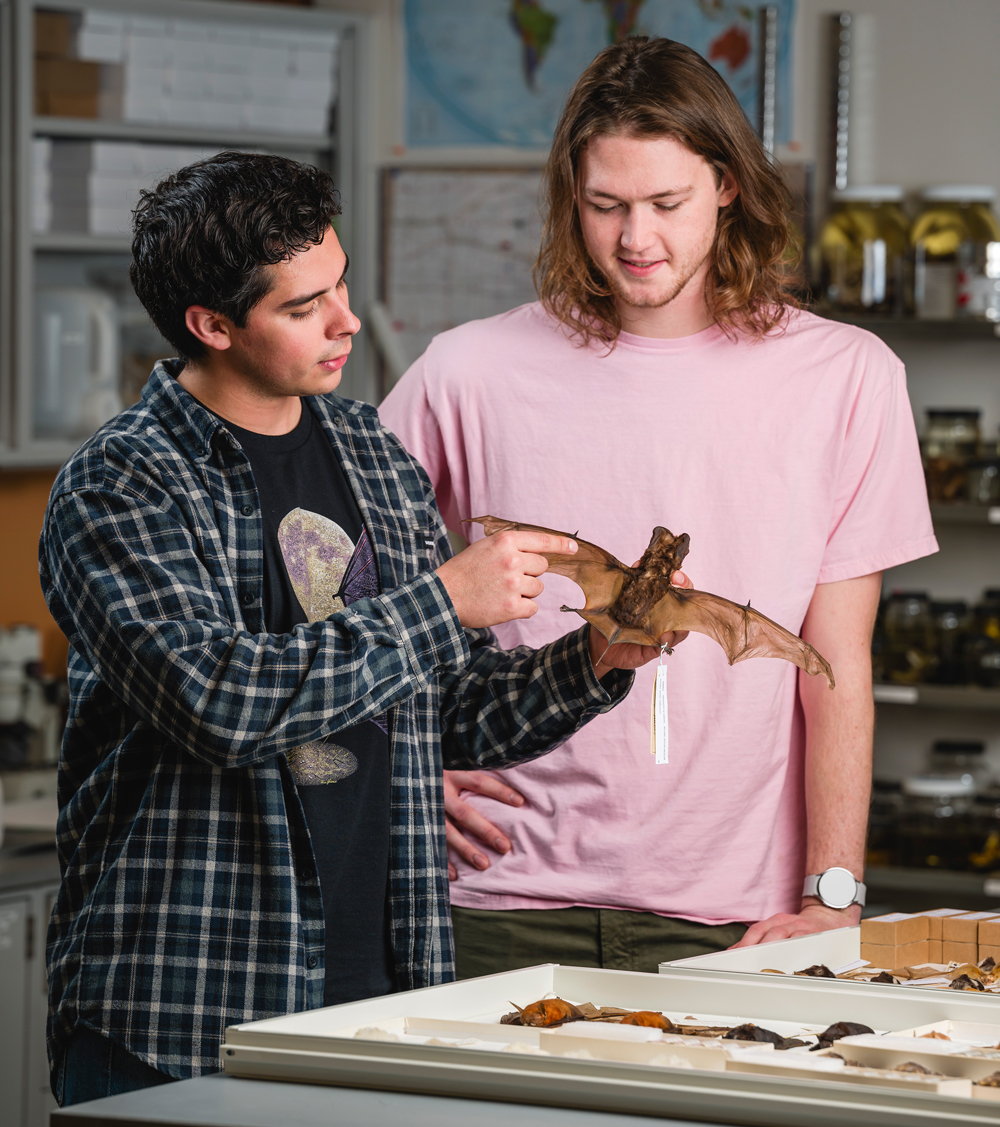
KNOWLEDGE-SHARING: Graduate student and bat researcher Daniel Ibañez IV demonstrates the technique for handling fragile specimens to senior Xavier Murray.
Field expeditions
Colella’s research has taken her and students across Kansas and around the world to collect specimens and contribute to important work on conservation and pathogen discovery — including Panama, Costa Rica, Alaska and Canada.
“I work a lot in southeast Alaska on mammals on islands, where more than 80% of the land is managed by the U.S. Forest Service under the Tongass National Forest Land and Resource Management Plan,” Colella said. “The Plan is currently undergoing revision, and my work on endemic species found there but nowhere else in the world is informing the update.”
She thinks it is important to recognize that modern museums get specimens in different ways, including through community partnerships. Many are donated by hunters, are found near the road or are provided by wildlife agencies to benefit science. And now, with data sharing, scientists all over the world can access these physical specimens and associated digital data for their research.
Wiens has been part of expeditions to Panama, Canada and Alaska, all in remote locations. “Being that far away from civilization was a very cool experience,” he said. “I enjoy being able to do fieldwork and seeing how different the ecosystems are out there.”
The work in Panama centered around trying to understand host pathogen dynamics specifically in bats, in partnership with the Gorgas Institute of Health. Panama has phenomenal bat diversity, with more than 100 species of bats in the country. In comparison, Kansas is about 10 times as large as Panama, but has about 90 species of mammals total. “We’re changing how fieldwork is done by working with local communities and making sure we’re empowering them to do their own research,” he said. “All the samples are split between the institutions so everyone has samples to enable collaborative research.”
For Hey, fieldwork is enjoyable because he gets to see animal and wild ecosystems in their natural state. “My experience in the field has been enlightening,” he said. “The museum side of fieldwork is very rigorous and meticulous with its holistic specimen collection ethic. We record the GPS locations and other meta data for every specimen, and then it’s all made available online as major research infrastructure. It’s also a lot of fun getting to know the study system and the environment I’m working on in this way.”
A mentor for life
For students of all levels, the relationships with faculty mentors can be the difference-maker in their success. Daniel Ibañez IV had several options for graduate school after completing his bachelor’s degree at New Mexico State University. A visit to the Biodiversity Institute and meeting the community of researchers sold him on KU. “It is such an incredible group of people — all the graduate students, all the professors,” he said. “You can walk up to any door and ask for help and everyone’s so ready to help you, and they want to.”
Ibañez said Colella has a strong work ethic and has a great grasp on what they should be doing ethically with specimens to maximize their value for future research. “She is an amazing professor and advisor who really cares,” Ibañez said. “It makes me try to match her energy. I see her as my mentor for life now, whether she likes it or not. So even when I’m in a similar faculty position, I could still reach out to her the way she reaches out to her former advisor.”
First-year postdoctoral researcher Marlon Cobos earned a Doctor of Philosophy in Ecology and Evolutionary Biology at KU. After graduation, Cobos saw Colella’s program as a perfect fit to further his research because her interests align with his and they complement each other’s expertise.
“Originally coming from Ecuador, I was uncertain about what my future would look like here,” Cobos said. “After years of being a part of KU, I feel very fortunate and believe my future has changed for the better. I have had the opportunity to be part of amazing research labs here at KU. All the experiences I have had here have significantly improved me as a researcher and as a person. Much of that improvement is attributed to how my advisors have guided my development and the amazing friendship and support they have provided.”
Rebecca Hawkins, a 2023 KU museum studies and Colella Lab alumna, is now the curatorial associate at the Sam Noble Museum in Norman, Okla. “Being involved in the Colella Lab gave me hands-on experience in collection management,” Hawkins said. “I learned how to collect and process specimens, work on special projects, lead volunteers and respond to pest outbreaks. Dr. Colella provided steady mentorship during my education. She was there when I had questions and needed advice, and she encouraged me to apply for my current job at the Sam Noble Museum. She was also comfortable letting me learn and explore independently through involvement in the mammal collection.”
An example of a special project spearheaded by Hawkins was the development of a publicly accessible key to the mammal skulls of Kansas, an image of which is now available as a poster in the KU Museum of Natural History. “That project taught me how to make research attractive for the public. I photographed the mammal skulls to capture their important features for identification, however, I discovered that the photographs were also beautiful in their own way — whether it was the tooth pattern on the hispid cotton rat or the boney lattice on the jackrabbit.”
Funding the future
Research projects being conducted in the Colella Lab have solid funding from the National Science Foundation and other grants, but there are areas that would benefit from private support, particularly student researchers and field expeditions. Travel is expensive, and more students could participate with additional resources. Even local fieldwork can be difficult without the proper equipment, such as a truck that can go off-road and across international borders. It is difficult to rent one, so Colella often uses her personal vehicle.
“Opportunities to support student research and fieldwork are number one on my list that would benefit from philanthropy,” she said. “Funding a student over the summer costs about $5,000. This is also the best time to do fieldwork such that lack of funding can limit opportunities.”
Being able to include and train more students would make a big difference for the lab and for future generations of researchers. “Field expeditions really shape the careers and interests of our students by taking them internationally and getting them outside of the classroom working with live animals. Those are experiences you never forget.”
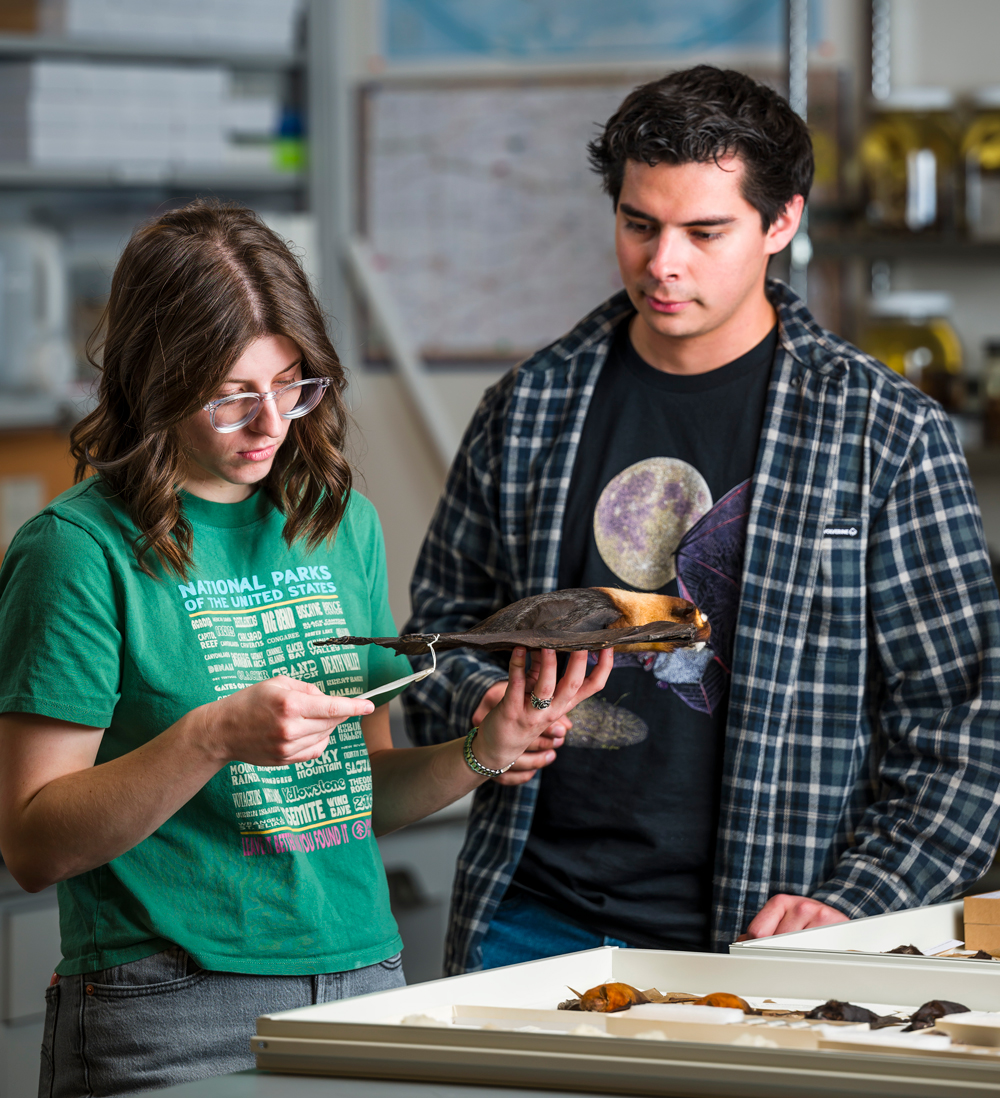
COLLECTIONS AT WORK: Museum Studies graduate student Catherine Dhority discusses characteristics of the flying fox with Ecology and Evolutionary Biology graduate student Daniel Ibañez IV.
Ben Wiens
KU Ecology and Evolutionary Biology Doctoral Candidate Ben Wiens found the perfect research nexus at the KU Biodiversity Institute and Natural History Museum for his focus on mammal genomics. Its vast collections, fieldwork opportunities and mentorship intersect with modern lab capabilities including the use of new third-generation DNA sequencing methods.
Raised in the small town of Goessel, Kan., about 40 miles north of Wichita, Wiens has traveled internationally and across Kansas to collect information about mammals that can carry diseases impacting humans. He is part of an institute-wide resurvey project studying mammal species from across the state and comparing data to that of 100 years ago. The project will advance understanding of species’ responses to changing environments and provide valuable insights for agriculture, conservation and other fields.
While Jocelyn Colella is his faculty mentor, Wiens is also a near-peer mentor to other students. “It’s been really fun seeing them learn how to do things on their own,” he said. “I would like a faculty job after graduation to continue doing research and mentoring students.”
Catherine Dhority
Catherine Dhority selected the Museum Studies Graduate Program at KU due to the number of museum institutions surrounding the Lawrence and Kansas City area. Dhority volunteers with the Colella Lab because she wants to understand how museum collections are used and it connects to her undergraduate interests in evolution. She is finishing up her master’s degree this semester and has a goal of becoming a collections manager after graduation.
Dhority enjoys being able to follow the process of how a specimen is catalogued into the collection from start to finish. This includes paperwork and field notes, fieldwork, processing and cataloging. “It has helped me see how scientists and researchers use collections and learn best practices to make these collections more accessible,” she said. “Being involved in the research in Dr. Colella’s lab has helped me apply what I’ve learned in classes about collections management and curation.”
Alex Hey
Alex Hey, a KU Ecology & Evolutionary Biology master’s student, joined the Colella Lab due to its global leadership in bioinformatics and the multidimensional training available from fieldwork to lab studies. Raised in West Chicago, Ill., Hey is currently studying mammal genomics and viral pathogens in wood rats (Neotoma).
Hey loves asking questions and starts most days by reading papers — from new research to historical work that provided the foundation for his current research. He then heads into the lab to tackle work from prepping specimens for the collection to performing DNA extractions and genome sequencing. Data management is also a vital aspect of Hey’s graduate studies with KU’s strength in bioinformatics and computer science courses helping students develop career-relevant skills. “You get a huge diversity of lab experience here,” he said. “We have a molecular lab, a wet lab and a dry prep lab here. I get all sides of that world, which was a huge factor in me coming here.”
Xavier Murray
KU senior Xavier Murray, who is majoring in Ecology, Evolution and Organismal Biology, enjoys the hands-on aspect of doing research in the lab and learning firsthand. “In the classroom, it’s like, here are five things to know about this subject, and then you move on to the next thing because there’s so much stuff to cover,” he said. “In the lab, it’s like, we are going to study bats and this very specific thing about them, and we don’t know where it will take us. You realize that within each subject, you can just keep going.”
Murray enjoys the ability to have input on the areas he works on in the lab, although he has been open to doing anything. He is considering applying for a research position after graduation and could see himself earning a doctorate in the future and becoming a professor or having a research-focused career.
Daniel Ibañez IV
Daniel Ibañez IV is a pursuing a Master’s in Ecology and Evolutionary Biology. He explored engineering and geography as an undergraduate before a job monitoring pecan trees for a research group set him on a biological science path. He is currently researching bats and viruses with the Colella Lab.
Working with museum collections at KU is an aspect he finds vitally important. Collections allow researchers to return to a specimen multiple times and compare data. With newer technologies, species collected 100 years ago can yield new information. Ibañez also appreciates the people he encounters daily, from students to emeritus faculty and staff.
“I love walking through the museum to get to my office,” he said. “If I have a question, I’ll walk over to the mammal collections and look at the specimens myself. If I can’t get an answer, I’ll go talk to (Curator Emeritus) Bob Timm — the historian of all mammalogy. It’s a special place.”
Help Researchers Explore New Ideas
To support mammal research, visit kuendowment.org/colella. Contact Michael Arp, AVP, Development at 785.832.7410 or [email protected] for general research interest.
